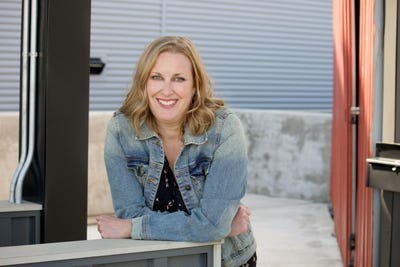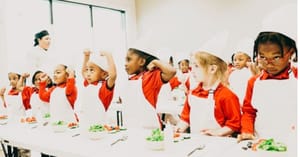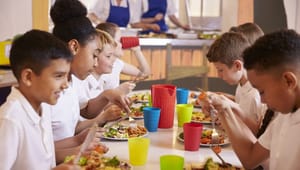Joy, positivity and chickpeas: Chartwells Higher Ed approaches planet-friendly menus in a ‘Thought-Ful’ wayJoy, positivity and chickpeas: Chartwells Higher Ed approaches planet-friendly menus in a ‘Thought-Ful’ way
Going beyond typical plant-forward recipes, R&D Chef Sarah Bodner introduces new ideas that can be replicated all year, not just at special Earth Day events.

New menu ideas are merging with mindfulness as Chartwells Higher Education partners with The Jed Foundation (JED), a nonprofit that aims to protect emotional health and to prevent suicide for teens and young adults. The Thought-ful event kicked off this month on Chartwells-served college campuses as a way to celebrate the simple joy that mealtimes can bring in the form of self-care with positivity, togetherness and an awareness of the planet’s health, too.
Sarah Bodner, Research and Development Executive Chef, Chartwells Higher Ed, wanted the impact of this event to last longer than just an LTO.
“It started as a big, lofty idea, but we were thinking of what small steps we could take to make a bigger impact,” she says. “Having a big event one day is terrific, but how could we move it forward, throughout the year and throughout the country?”
As a starting point of “Good for You, Good for the Planet,” Bodner reached out to campuses with plant-based dining halls or concepts already in place, and asked what they would like to see, menu-wise.
What she found was a bit counter intuitive. “Plant-forward menus don’t have to be all or nothing,” she says. “You can go from a beef burger to a veggie burger and back again.”
The knee-jerk reaction to beef is that it’s bad for carbon footprints. But that doesn’t mean people will stop eating it altogether, in general. One solution is the blending idea, and a beef and veggie picadillo “was one of the most polarizing items,” Bodner says. “Beef is a ruminant meat and normally wouldn’t be included on any Earth Day menu, but overall, this could be a game changer for our carbon footprint.
For example, taco meat in the past has just meant beef and seasoning. But the “game changer” is beef with peppers, cilantro and salsa mixed in. “It not only reduces the beef used, but it’s also a flavor bomb. We can reduce the actual beef by 25% and implement that, and that is a way bigger change than just doing a protein flip for one day. It’s out-of-the-box thinking for a bigger overall change.”
Continuing to consider the cow, dairy-heavy recipes got a makeover, too.
“Typically recipes with a lot of dairy are usually high in terms of carbon footprint, but they’re also highly popular on a college campus, so we re-engineered some of those dairy-heavy recipes, like alfredo lasagna,” Bodner says. “We used a cauliflower base instead of ricotta and a little parmesan, so it still tastes cheesy, but with a lower carbon footprint.”
Vodka sauce, or “pink” pasta sauce used oat milk instead, and that was a huge hit with Bodnar’s pickier family members, she says. “Even though it’s a simple idea, it made converts out of my family, and I thought vegans on campus would appreciate being able to have a ‘creamy’ sauce for pasta all year.”
Protein from plants like chickpeas also came in clutch for the Though-Ful menus.
“We love using chickpeas as a protein-packed option since it’s a whole food,” Bodnar says. “Chickpea chicken salad is a great recipe because it lends itself to all the positives of chickpeas with a creamy, mayo-like feel from soy-free vegan mayo.”
The chickpea liquid from the can (aquafaba) can also be upcycled into merengues for planet-friendly desserts. Other new menu items that were developed include Vegan Lentil Chorizo, Vegetable Quesadillas and Tangy Gold BBQ Breaded Cauliflower Wings.
Animal-based proteins mingle with plant-based proteins on several plates, like the BBQ Glazed Turkey and Vegetable Meatloaf with Ranch Potatoes found at Illinois Tech and Grilled Adobo Chicken with Chorizo-style Tofu, Cilantro-Lime Rice and Refried Pinto Beans at the University of Arkansas.

The “Good for You” side of the Though-Ful menus varied by campus and included mindfulness exercises, therapy dogs, classes for new hobbies, social mixers and more, all focused on the well-being of students.
“Self-care is top-of-mind for today’s college students, and we wanted to create an event that promotes well-being while also spreading joy and positivity to others on campus,” said Chartwells Higher Ed CEO Eva Wojtalewski in a statement. “We’re hopeful that the variety of wellness themes helps students bring Thought-Ful to life on campus in their own unique ways.”
About the Author
You May Also Like




.jpg?width=300&auto=webp&quality=80&disable=upscale)

